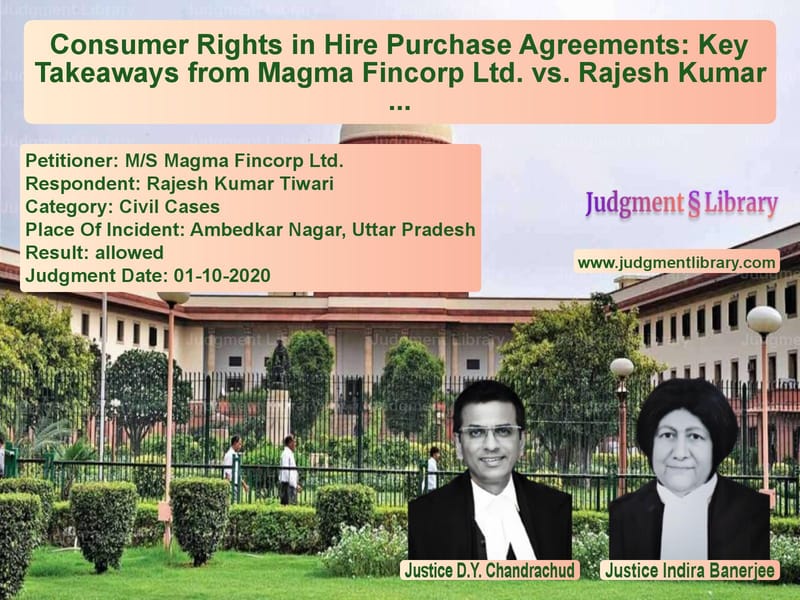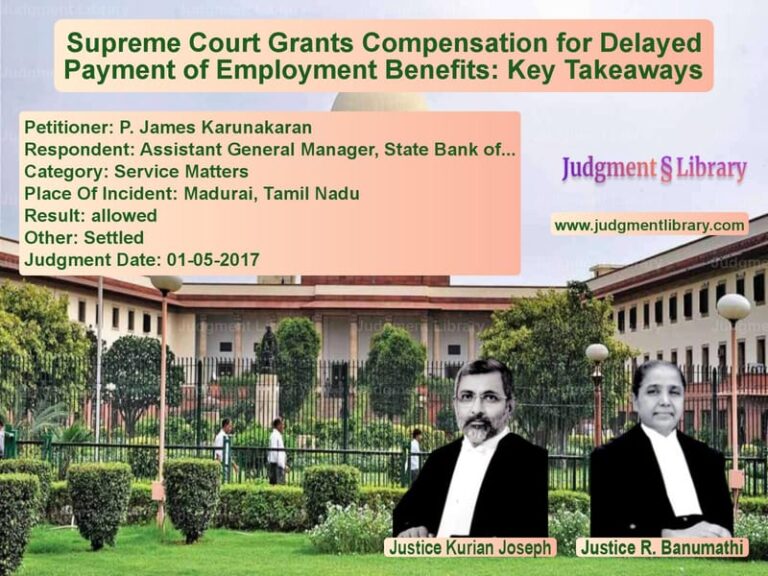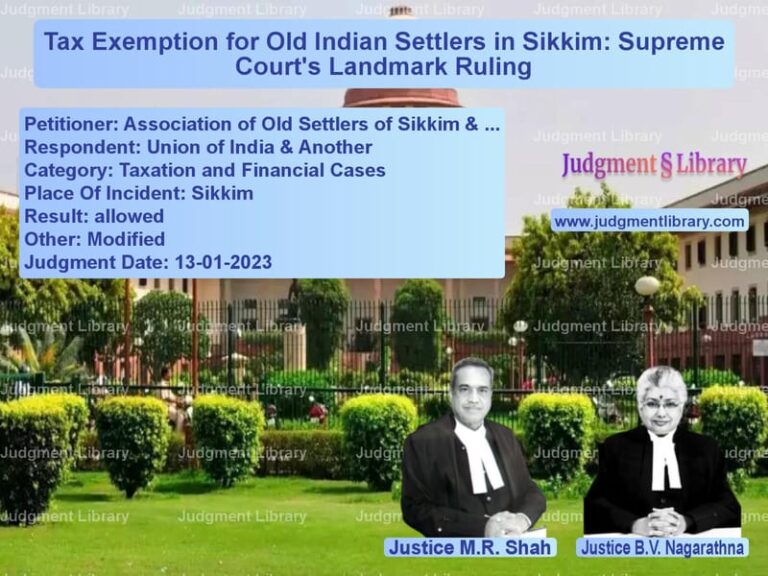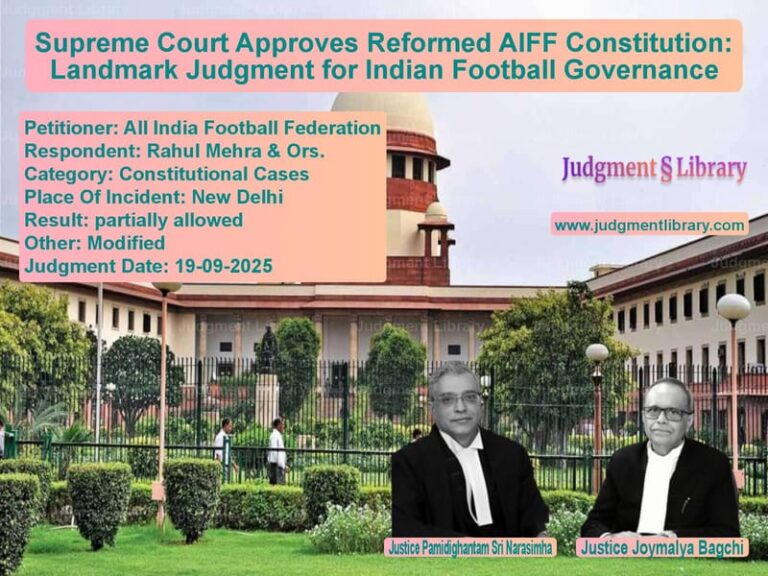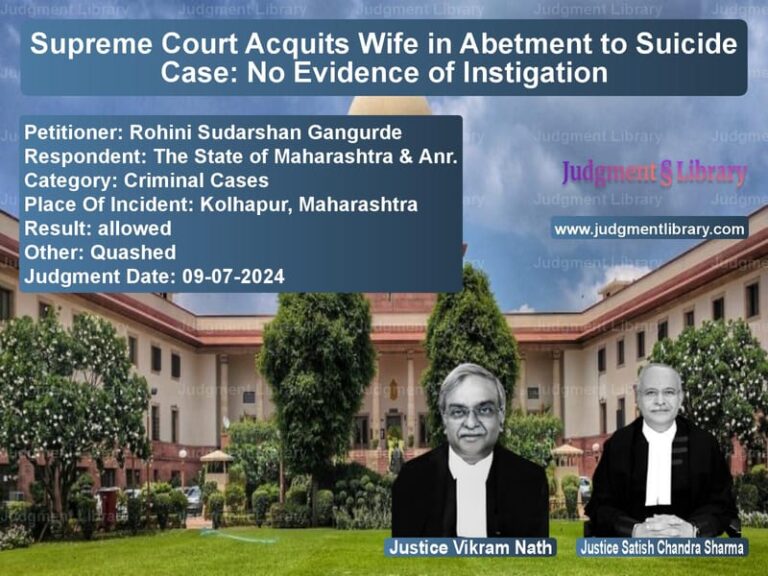Consumer Rights in Hire Purchase Agreements: Key Takeaways from Magma Fincorp Ltd. vs. Rajesh Kumar Tiwari
The case of M/S Magma Fincorp Ltd. vs. Rajesh Kumar Tiwari raises significant questions regarding consumer rights under hire purchase agreements, financial institutions’ repossession rights, and legal remedies available to consumers. The Supreme Court judgment delivered by Justices D.Y. Chandrachud and Indira Banerjee provides clarity on the legal position of financiers and consumers in hire purchase transactions.
This case revolves around the repossession of a vehicle by a financier due to payment defaults by the hirer. The respondent, Rajesh Kumar Tiwari, had taken a loan from Magma Fincorp Ltd. to purchase a vehicle but defaulted on payments. The financier repossessed the vehicle without proper notice, leading the consumer to file a complaint under the Consumer Protection Act, 1986.
Background of the Case
Rajesh Kumar Tiwari entered into a hire-purchase agreement with Magma Fincorp Ltd. for purchasing a Mahindra Marshal Economic Jeep. The total cost of the vehicle was Rs. 4,21,121, of which the complainant made an initial payment of Rs. 1,06,121, while the remaining Rs. 3,15,000 was financed by Magma Fincorp. The complainant was required to repay Rs. 4,38,585 in 35 monthly installments of Rs. 12,531.
However, the complainant defaulted in making timely payments. After paying only seven installments, financial difficulties and an accident case led to further defaults. The financier, citing default, repossessed the vehicle without proper notice. The complainant then approached the District Consumer Forum, seeking compensation for the repossession.
Arguments of the Petitioner (Magma Fincorp Ltd.)
- The complainant had entered into a hire purchase agreement, under which the financier retained ownership of the vehicle until all installments were paid.
- Since the complainant defaulted on payments, the financier had the right to repossess the vehicle as per the agreement.
- A notice was issued before repossession, fulfilling legal requirements.
- The complainant was liable to pay Rs. 2,80,132.59 as outstanding dues.
- The vehicle was sold in November 2003, following standard procedure.
Arguments of the Respondent (Rajesh Kumar Tiwari)
- The vehicle was repossessed without proper notice, violating the principles of natural justice.
- Even though he had defaulted on payments, he was willing to clear outstanding dues and continue payments.
- The financier acted in an arbitrary manner, causing financial and mental hardship.
- The repossession and subsequent sale of the vehicle without due process constituted unfair trade practices.
Findings of the Consumer Disputes Redressal Authorities
The District Forum ruled in favor of the complainant, directing Magma Fincorp to pay Rs. 2,23,335 along with 10% interest per annum, Rs. 10,000 for mental agony, and Rs. 1,000 as litigation expenses. This decision was upheld by the State Commission and later by the National Commission.
Supreme Court Judgment
Key Observations
- The Supreme Court reiterated that under a hire purchase agreement, the financier remains the owner of the vehicle until all installments are paid.
- The court acknowledged that the complainant had defaulted and that the agreement allowed the financier to repossess the vehicle.
- However, the financier failed to provide proper notice before repossession, as the address in the notice was incorrect.
- The court held that repossession without notice amounts to deficiency in service.
- While the financier had the right to repossess the vehicle, it should have followed proper procedure.
Key Excerpts from the Judgment
“A hire-purchase agreement does not create ownership rights for the hirer until all payments are made. However, repossession must be done in accordance with the agreement and due process.”
“The financier remains the owner, but improper repossession without notice constitutes a deficiency of service.”
Final Ruling
The Supreme Court set aside the orders of the lower consumer forums, ruling that while the financier had the right to repossess the vehicle, it erred in not issuing a valid notice to the complainant. As a result, the court awarded Rs. 15,000 in damages for deficiency of service due to improper notice.
Legal Implications
For Consumers:
- Consumers under hire purchase agreements do not gain ownership of the vehicle until all installments are paid.
- If a financier repossesses a vehicle without proper notice, the consumer can seek damages under the Consumer Protection Act.
- Even in cases of default, procedural fairness must be maintained.
For Financial Institutions:
- Financiers must ensure proper notice is served before repossession.
- Use of force or unauthorized agents for repossession is unlawful.
- Courts will uphold hire purchase agreements, but procedural violations can lead to liability.
Conclusion
This judgment highlights the balance between contractual rights of financiers and consumer rights. While financiers can enforce hire purchase agreements, they must adhere to fair procedures. Consumers, on the other hand, should be aware that defaulting on payments can lead to repossession. This case reinforces the importance of procedural fairness in financial transactions and sets a precedent for similar disputes.
Petitioner Name: M/S Magma Fincorp Ltd..Respondent Name: Rajesh Kumar Tiwari.Judgment By: Justice D.Y. Chandrachud, Justice Indira Banerjee.Place Of Incident: Ambedkar Nagar, Uttar Pradesh.Judgment Date: 01-10-2020.
Don’t miss out on the full details! Download the complete judgment in PDF format below and gain valuable insights instantly!
Download Judgment: MS Magma Fincorp Lt vs Rajesh Kumar Tiwari Supreme Court of India Judgment Dated 01-10-2020.pdf
Direct Downlaod Judgment: Direct downlaod this Judgment
See all petitions in Consumer Rights
See all petitions in Contract Disputes
See all petitions in Debt Recovery
See all petitions in Judgment by Dhananjaya Y Chandrachud
See all petitions in Judgment by Indira Banerjee
See all petitions in allowed
See all petitions in supreme court of India judgments October 2020
See all petitions in 2020 judgments
See all posts in Civil Cases Category
See all allowed petitions in Civil Cases Category
See all Dismissed petitions in Civil Cases Category
See all partially allowed petitions in Civil Cases Category

